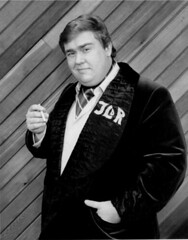Somebody on this blog asked me what I did for a living, and speculated that I am a dentist. Not so. I probably would have been an evil (not to mention incompetent) dentist -- not a torturer, more like a nitrous oxide junkie who tries to fool around with the dental hygenist.
I am told that there are writers who do this full time -- write fiction, that is -- but the vast majority of us slaves to the keyboard must toil away at a "real job" in the "real world."
One of the more helpful things I learned in graduate school came in the form of a two-hour seminar. A few of the school's creative writing teachers were to give us pointers about how to make a living and still write. The general theme was "get a job that gives you a lot of time to write, like a security guard" or "don't worry about money – that will take care of itself." (The latter, sadly, is a direct quote from a poetry teacher who told us a story about how he was broke and then an N.E.A. grant fell from the sky, and it's like, man you got to do your art first! Like dude! Then I found out he had a major-league sugar momma).
So I learned not to pay attention to anything these jokers had to say about earning a living.
In an informal survey taken in the recesses of my brain, here's the most common ways writers earn their way:
1. Teacher (Creative Writing)
2. Journalist/Copyeditor
3. Administrator/Manager (Often at a college)
4. Temp
5. Pizza Delivery/Food Delivery/Internet Identity Thief
I have worked at three of these jobs. You can guess which ones.
Those are typical jobs. Here are others that give you material comfort and time to write:
1. Parents are loaded/Trust fund of the century
2. Invested in Cisco back in '91/Had a feeling and bet the farm on Buster Douglas
3. Sold first child, put second up for auction
Other jobs, which also allow for some material comfort and lots of time:
1. Unemployed Member of the Proletariat With Great Pay & Benefits (Europe only)
2. Evil Lawyer/Disgraced Executive With $100 Million/Arms Dealer
3. License plate maker. Without a doubt, leaves you with the most time.
The best situation, of course, is that you're paid for your semi-incoherent scribbling in fiction. But even those lucky few are rare: most full-time fiction writers dabble in magazine writing (good $, maintain integrity), screenwriting (awesome $, lose integrity), and criticism (crapola $, huge amounts of integrity, but still crapola $). You really only get to be a full-time critic after you've published a book, not before you write one, unless your name is Dale Peck or James Walcott or James Wood and your fame as a critic propels your fiction efforts.
I am counting on this blog to do the same for me. It's a long shot, but so was Buster Douglas.
Sunday, January 30, 2005
Gimme Some Money
Subscribe to:
Comment Feed (RSS)


|